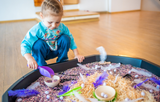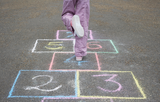10 Gross Motor Skills Development Ideas For Kids
The development of gross motor skills lays the groundwork for fine motor skills, and aids speed, reaction and risk assessment.
10 Activities To Develop Gross Motor Skills
1. Obstacle Course
Set up an age and skill appropriate obstacle course! This is an easy activity to practice indoors or outdoors at home. You can include equipment like Step-A-Stumps to practice balance, Squish Steppers for balance and coordination, and a Catch Cup for hand eye coordination. Or you can use a Slackers Obstacle Course kit, which is made to be versatile for individual or team use.
2. Bounce, Throw and Catch a Ball
These will all help develop hand eye coordination! Throw and catch an age appropriate ball, or bounce a ball on the ground. Learning to catch can be a tricky skill to master so our Easy Catch Ball is perfect for fingers to grab and the bright colours are great to help them easily see the ball coming. For more advanced skills, try a smaller ball, a Catchtail Ball, or playing hand ball with another person or against a wall. Bluey fans might like to play Keepy Uppy with a balloon!
3. Climbing
Get outside and climb some play equipment, a Ninja Net or Ninja Rope Ladder (attached to a Ninja Line), or even a tree.
Climbing improves balance, hand eye coordination, agility and strength.
4. Yoga
Yoga increases flexibility, balance and strength, as well as practicing mindfulness. There are lots of virtual classes available on demand, or incorporate Yoga practice into a game with ThinkFun Yoga Spinner Game, which approaches yoga one pose at a time - and often ends in laughter which is also great for the soul!
5. Hopscotch
A bit of sidewalk chalk will get an outdoors hopscotch game up and running. It’s a quick easy way to increase balance and strength as well as practicing hopping and jumping.
6. Animal Walks
Animal walks build gross motor skills including motor planning and coordination. Our Animal Walk Cards have been developed by Kids PT to engage kids of all abilities. They’re lots of fun and very versatile. You can use them for a movement break between tasks, or a stand-alone activity. The bright and cheerful characters will help motivate children and get them moving!
7. Create a Sensory Walking Path
Pop down cushions, Sensory Stones, Sensory Mats, wooden planks, carpet squares and other textured surfaces to walk along and allow feet to explore. Extras like paint, paint and shaving foam could be added for extra messy sensory fun! To extend this activity it could be turned into a game of The Floor is Lava.
8. Riding, Scooting or Hopping Toys
Practice bi-lateral coordination, balance, build strength and fitness with riding activities. Try equipment like a Scooter Board (add a set of Scooter Paddles to practice pushing and pulling) or Bouncy Riders if you’re practising indoors. Hopper Balls are great for a cardio work out to burn off that excess energy and strengthen little legs.
9. Play Simon Says
This is a quick and easy way to practice a range of skills - incorporate skipping, hopping, balancing on one leg, crawling, rolling and more all with simple instructions and no equipment. Use Simon Says while waiting outside for an appointment or between other activities.
10. Jump on a Trampoline
Trampolines provide children with so much input! They are excellent for proprioceptive and vestibular input, and provide cardiovascular exercise.
Gross motor skills are developed when trampolining by strengthening muscles, improving endurance and increasing balance and coordination by bouncing alone! This can be further improved with trampoline attachments like a basketball ring so the jumper can shoot hoops, or simply adding a balloon to play with while bouncing.
Who do you see if you are worried about your child's Gross Motor Skills development?
If your child is young, and doesn’t see any specialists, see your Maternal Child Health Nurse (MCHN) and / or your GP in the first instance.
For older children, talk to your GP. If your child already sees a paediatrician, occupational therapist and / or physiotherapist, you should raise any concerns with them also for their professional opinion and suggestions.
Recent Posts
-
What Is a Sensory Diet?
What Is a Sensory Diet? (And No, It’s Not About Food!) If you’ve ever heard the term sen …Jul 25, 2025 -
Why Sensory Breaks Should Be on Every School Timetable
As a mum of three neurodivergent boys, I’ve seen what a huge difference the right support can …Jul 09, 2025 -
Is It Trendy To Get an ADHD or Autism Diagnosis These Days?
“It’s So Trendy to Be Autistic Now”… Umm, No. Let’s Talk. Every now a …Jul 02, 2025




